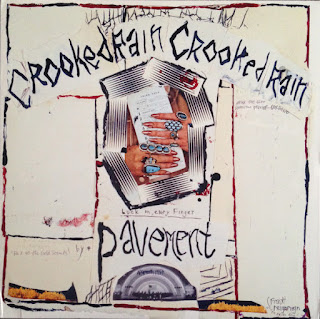Talk Talk - Laughing Stock (Album Review)
Talk Talk - Laughing Stock
(1991)
My copy: 2016 reissue by UMe and Polydor.
Laughing Stock was the fifth and final release from the British band Talk Talk; it is also one of the greatest deconstructions of rock music ever created. Talk Talk had begun with synth-pop, and were led into fame by a few catchy singles (“It’s My Life” which had all personality removed by No Doubt). Later into the Talk Talk’s career, the desire to experiment and strip away conventional song structures grew increasingly powerful, resulting in Laughing Stock being hailed as one of the earliest “post-rock” albums.
Laughing Stock’s core philosophy revolves around the music’s relationship with silence. Vocalist Mark Hollis understood the power held by silence, and manipulated songs to hold attention by reveling in quiet as opposed to loud and obnoxious. “Myrrhman” lets somber, warm guitar chords ring out into a void, only accompanied by dreary strings and Hollis’s smooth pleading voice. “Myrrhman” is the musical equivalent to film noir: an expanse of dark, grainy silhouettes moving through back alleys and desolate runways. The drums occasionally putter about allowing bass and piano to form faint structure until it is all traded away for a simple string melody that carries an immense emotional weight. The use of subtlety is not a gimmick here; it is done with such a level of professionalism and calculated expertise that the tracks feel as though they were constructed by a force of nature.
“Ascension Day” sees a more formal structure take shape with steady drums and bass under icy guitar melodies. Track 2 is still minimal, but crescendos out of the blue with crashing cymbals and sharp plunging guitar chords. Hollis offers respite from the density with his haunting charisma, reciting poetry over skeletal passages of organ and just-out-of-frame piano. The steep walls of sound here would go on to influence countless new waves of post-rock bands although most fail to recognize that the unembellished writing is what makes Laughing Stock so genius. “Ascension Day” adds harmonica for texture and on its final explosion, droning organs build under the tearing layers of cymbals before the track ends suddenly, again demonstrating the loudness of silence.
Gentle piano and ethereal guitar slowly arise out of the ashes of the previous track on “After The Flood.” Eerie drones eventually settle into calm reflection as instruments wrap around the repetitive drums and bouncing bass. Laughing Stock’s use of percussive repetition mixed with the atmospheric addition and subtraction of sounds likely reached out and even influenced trip-hop, as nuance would be a key trait of early albums in said genre. Feedback enters to whine and ripple through “After The Flood” which ebbs and flows like a great river, all elevated by Hollis’s vocals that lash out like shouts from within a dream. “Taphead” starts out tender. Though the guitar tones are simple, effort was put into the recordings to ensure that they are warm and well suited to serve each song. “Taphead” assembles a more varied patchwork of sounds, with instruments wandering in the background like souls lost in the afterlife; the angelic voice of Hollis seeks to guide them to their respective fates.
“New Grass” is the most romantic song, swinging into a 3 ⁄ 4 time signature with guitar melodies that flutter like rays of sunlight peeking through the trees. Talk Talk are also experts in dynamics, mixing glassy organ keys loudly in “New Grass” to breathe more personality into the composition. “New Grass” flows and recedes into tender duets between the drums and piano, mixing in dark tones to bring a melancholy sense to the mostly loving air. Laughing Stock ends on “Runeii,” a depressive vocal rumination with deep guitar and flickering accompaniments. Laughing Stock slowly drifts back into the far-off valley from which it emerged: over 40 minutes have passed and yet the time was only felt in the longer, more repetitive moments.
On their final album, Talk Talk painted a series of distinct portraits that dragged rock music as far from its roots as possible (thus post-rock). Laughing Stock was not received well commercially, however it will deservedly go down in history as one of the most influential and spiritually powerful offerings in the rock canon. The emotion on this album is almost unparalleled.
Buy this album, no matter the cost. R.I.P. Mark Hollis.




Comments
Post a Comment